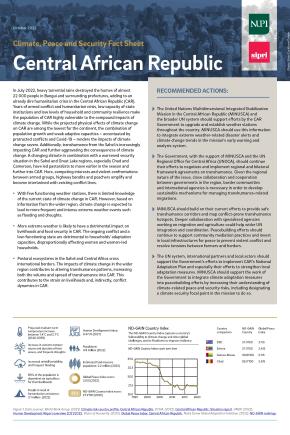Climate, Peace and Security Fact Sheet: Central African Republic (2022)

In July 2022, heavy torrential rains destroyed the homes of almost 22 000 people in Bangui and surrounding prefectures, adding to an already dire humanitarian crisis in the Central African Republic (CAR). Years of armed conflict and humanitarian crisis, low capacity of state institutions and low levels of household and community resilience make the population of CAR highly vulnerable to the compound impacts of climate change. While the projected physical effects of climate change on CAR are among the lowest for the continent, the combination of population growth and weak adaptive capacities – accentuated by protracted conflicts and Covid-19 – renders the impacts of climate change severe. Additionally, transhumance from the Sahel is increasingly impacting CAR and further aggravating the consequences of climate change. A changing climate in combination with a worsened security situation in the Sahel and Great Lake regions, especially Chad and Cameroon, have led pastoralists to move earlier in the season and further into CAR. Here, competing interests and violent confrontations between armed groups, highway bandits and poachers amplify and become intertwined with existing conflict lines.


